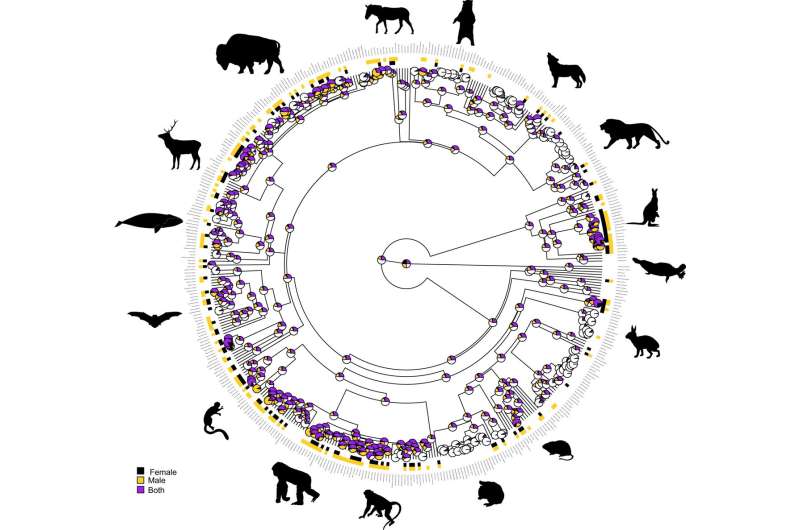October 4, 2023 report
This article has been reviewed according to Science X's editorial process and policies. Editors have highlighted the following attributes while ensuring the content's credibility:
fact-checked
peer-reviewed publication
trusted source
proofread
Same-gender sexual behavior found to be widespread across mammal species and to have multiple origins

A trio of ecologists from Estación Experimental de Zonas Áridas, Universidad de Granada and Centro de Investigaciones sobre Desertificación has found same-gender sexual behavior to be widespread across mammal species and report that it appears to have multiple independent origins.
In their study, reported in the journal Nature Communications, José Gómez, A. Gónzalez-Megías and M. Verdú, surveyed research papers to compile a database of same-gender sexual behavior in mammals.
Prior research has shown that same-gender sexual behavior is widespread in the animal kingdom—it has been reported in more than 1,500 species, both invertebrates and vertebrates. In this new effort, the researchers took a closer look at such behavior in mammals.
To that end, they undertook an extensive search and analysis of existing literature where such behavior was observed in a mammalian species. Each instance was added to the database. Once they had compiled as much data as they could find, they sought patterns of evolutionary relationships that could be associated with other types of behavior.
In their work, the researchers found that same-gender, short-term sexual behavior was widespread. They also found it was nearly equally frequent in both males and females across species, and there did not appear to be any shared origins; thus, such behavior likely arose independently in different species.
The research team also found that such behavior was more often seen in social species, which could mean that it plays a role in establishing social relationships. They also found it more likely to occur in species where there were higher rates of adulticide (where adults kill one another occasionally). This, they suggest, hints at the possibility that same-gender encounters could serve as a means for mitigating violence between adult males.
The researchers note that their findings should not be used by others to explain long-term, same-gender relationship behaviors in humans because their study focused only on short-term interactions, not permanent behavior patterns.
More information: José M. Gómez et al, The evolution of same-sex sexual behaviour in mammals, Nature Communications (2023). DOI: 10.1038/s41467-023-41290-x
Journal information: Nature Communications
© 2023 Science X Network




















